lesson与class的区别
浙江省中考英语总复习第1部分教材知识梳理篇第25课时九下Modules12精讲试题外研版
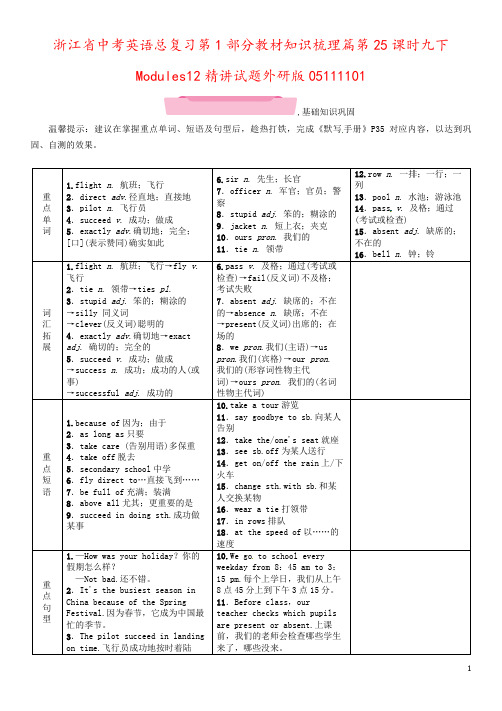
浙江省中考英语总复习第1部分教材知识梳理篇第25课时九下Modules12精讲试题外研版05111101,基础知识巩固温馨提示:建议在掌握重点单词、短语及句型后,趁热打铁,完成《默写手册》P35对应内容,以达到巩固、自测的效果。
重点单词1.flight n. 航班;飞行2.direct adv.径直地;直接地3.pilot n. 飞行员4.succeed v. 成功;做成5.exactly adv.确切地;完全;[口](表示赞同)确实如此6.sir n. 先生;长官7.officer n. 军官;官员;警察8.stupid adj. 笨的;糊涂的9.jacket n. 短上衣;夹克10.ours pron. 我们的11.tie n. 领带12.row n. 一排;一行;一列13.pool n. 水池;游泳池14.pass v. 及格;通过(考试或检查)15.absent adj. 缺席的;不在的16.bell n. 钟;铃词汇拓展1.flight n. 航班;飞行→fly v.飞行2.tie n. 领带→ties pl.3.stupid adj. 笨的;糊涂的→silly 同义词→clever(反义词)聪明的4.exactly adv.确切地→exactadj. 确切的;完全的5.succeed v. 成功;做成→success n. 成功;成功的人(或事)→successful adj. 成功的6.pass v. 及格;通过(考试或检查)→fail(反义词)不及格;考试失败7.absent adj. 缺席的;不在的→absence n. 缺席;不在→present(反义词)出席的;在场的8.we pron.我们(主语)→uspron.我们(宾格)→our pron.我们的(形容词性物主代词)→ours pron. 我们的(名词性物主代词)重点短语1.because of因为;由于2.as long as只要3.take care (告别用语)多保重4.take off脱去5.secondary school中学6.fly direct to…直接飞到……7.be full of充满;装满8.above all尤其;更重要的是9.succeed in doing sth.成功做某事10.take a tour游览11.say goodbye to sb.向某人告别12.take the/one's seat就座13.see sb.off为某人送行14.get on/off the rain上/下火车15.change sth.with sb.和某人交换某物16.wear a tie打领带17.in rows排队18.at the speed of以……的速度重点句型1.—How was your holiday?你的假期怎么样?—Not bad.还不错。
200个相近单词的区别
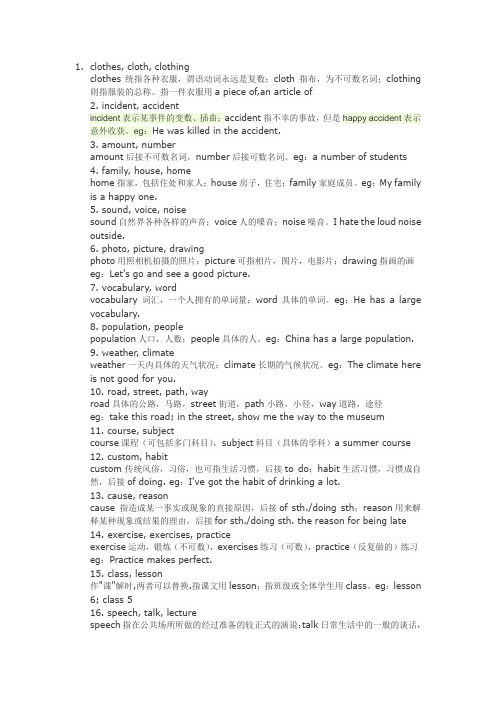
1.clothes, cloth, clothingclothes统指各种衣服,谓语动词永远是复数;cloth指布,为不可数名词;clothing 则指服装的总称。
指一件衣服用a piece of,an article of2. incident, accidentincident表示某事件的变数、插曲;accident指不幸的事故,但是happy accident表示意外收获。
eg:He was killed in the accident.3. amount, numberamount后接不可数名词,number后接可数名词。
eg:a number of students4. family, house, homehome指家,包括住处和家人;house房子,住宅;family家庭成员。
eg:My family is a happy one.5. sound, voice, noisesound自然界各种各样的声音;voice人的嗓音;noise噪音。
I hate the loud noise outside.6. photo, picture, drawingphoto用照相机拍摄的照片;picture可指相片,图片,电影片;drawing指画的画eg:Let's go and see a good picture.7. vocabulary, wordvocabulary词汇,一个人拥有的单词量;word具体的单词。
eg:He has a large vocabulary.8. population, peoplepopulation人口,人数;people具体的人。
eg:China has a large population.9. weather, climateweather一天内具体的天气状况;climate长期的气候状况。
eg:The climate here is not good for you.10. road, street, path, wayroad具体的公路,马路,street街道,path小路,小径,way道路,途径eg:take this road; in the street, show me the way to the museum11. course, subjectcourse课程(可包括多门科目),subject科目(具体的学科)a summer course12. custom, habitcustom传统风俗,习俗,也可指生活习惯,后接to do;habit生活习惯,习惯成自然,后接of doing. eg:I've got the habit of drinking a lot.13. cause, reasoncause 指造成某一事实或现象的直接原因,后接of sth./doing sth;reason用来解释某种现象或结果的理由,后接for sth./doing sth. the reason for being late14. exercise, exercises, practiceexercise运动,锻炼(不可数),exercises练习(可数),practice(反复做的)练习eg:Practice makes perfect.15. class, lesson作"课"解时,两者可以替换.指课文用lesson;指班级或全体学生用class。
class, lesson, course, subject

易混淆的字与词– 6 [ class, lesson, course, subject ] (1)易混淆的字与词– 6 [ class, lesson, course, subject ] (1)class n. 班级、班上、课、节课(堂课)、课程lesson n. 课、节课(堂课)、课程course n. 节课(堂课)subject n. 学科注意 :1) class除了有班级、班上外,class与lesson的异同在于class是许多lessons组成。
所以class是指某段期间(如:学期)的什么课(如英文课–English class),而lesson是指那堂课(如英文那堂课– English lesson)。
但class也可以是指那节课或那堂课。
2) course指的是课程,在英国使用,在美国使用class。
class noun - 1 班级、班上1. My young brother is in the fifth-year class.2. Jason and I are in the magnet class at school. 资优班3. Rosa and Cathy were in the same class in chemistry.4. Lora is at the top of her class.5. Our class took a vacation at last weekend.6. Is Victor’s brother in the sixth-year class? 六年级class noun - 2 课1. Mr. Long teaches an English class in a senior high school.2. Ms. Dunlop teaches ESL classes for the ESL students.3. It is very difficult for a Taiwanese teacher to teach an English class. = It is very difficult for a Taiwanese teacher to teach English lessons.4. Mr. Blacksmith teaches many English classes including English 10, 11, and 12.5. Do you have PE class this semester?6. I will take English class next semester.7. I don’t have school today because it is Sunday. 没上学= I have no school today because it is Sunday.= I have no classes today because it is Sunday. 没上课= There are no classes today because it is Sunday.8. Dennis: Is Fanny still in class? 还在上课Debra: Yes, she is. Her class doesn’t end until 12:00 (or noon).9. Science teacher flunked because he had skipped class over ten times. (当掉) (逃课)= Science teacher flunked because he had cut class over ten times.class noun - 3 节课(堂课)1. How many classes do you have this Friday afternoon?= How many lessons do you have this Friday afternoon?2. Carol has a math class at 10:15 this morning.= Carol has a math lesson at 10:15 this morning.3. What time is your last class?= What time is your last lesson?。
lesson和class的区别

lesson和class的区别lesson:通常指一次课,比如we have a lesson today。
指某人参加某次会议,比如she was speaking at a meeting。
例句: we had a lesson today, so the students was not very happy。
他们上了一堂很无聊的课。
class:通常指上课时间,比如she went to class last night。
指某人上某次课。
比如she went to school for a couple of days。
指某人上某次课。
比如she went to the dentist yesterday。
注意:前者没有“不是”之类的后缀,如she didn't go to class。
后者有“不是”的意思。
因此,后者只能用作动词,比如he went to school。
也可以用作名词,比如she went to class。
当然,前者是固定搭配,如he goes to school,后者是不固定的。
还要记住两个短语: class room:教室。
指在教室里上课的地方。
比如he went to class last night in his room。
he goes to class today in class。
一般指在自己的房间里上课。
比如we went to class yesterday at our house。
我们昨天在家里上课。
eg: her teacher told her to do this, and then they went to class。
她的老师告诉她做这件事,然后他们去上课了。
i went to class last night in my house。
我昨天晚上在家里上的课。
其他词性的短语: classes:学科。
指学习各种知识的地方。
eg:i went to school for arts last year。
人教版八年级英语上册第五单元教材全解
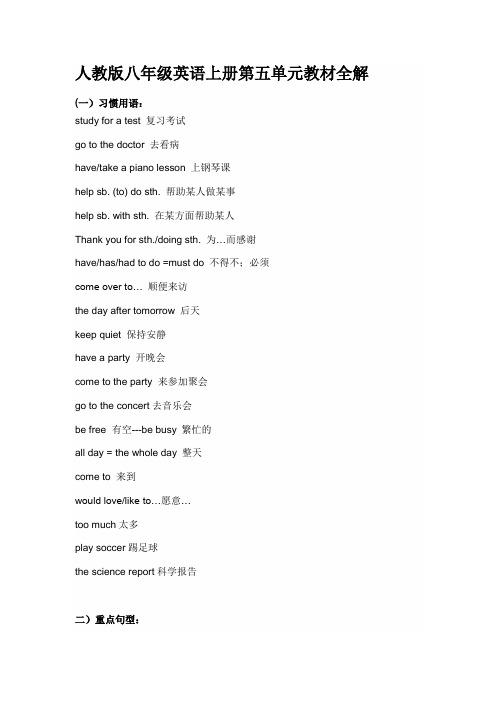
人教版八年级英语上册第五单元教材全解(一)习惯用语:study for a test 复习考试go to the doctor 去看病have/take a piano lesson 上钢琴课help sb. (to) do sth. 帮助某人做某事help sb. with sth. 在某方面帮助某人Thank you for sth./doing sth. 为…而感谢have/has/had to do =must do 不得不;必须come over to… 顺便来访the day after tomorrow 后天keep quiet 保持安静have a party 开晚会come to the party 来参加聚会go to the concert去音乐会be free 有空---be busy 繁忙的all day = the whole day 整天come to 来到would love/like to…愿意…too much太多play soccer踢足球the science report科学报告二)重点句型:1.Can you come to my party on Wednesday? 你星期三能来参加我的晚会吗? 2.Sorry.I can't.I have a piano lesson. 对不起,我不能。
我要上钢琴课。
3.Sure.I'd love to.当然,我愿意。
4.I'm playing soccer.我在踢足球。
5.I have too much homework(to do) this weekend .这个周末我有太多家庭作业(要做)。
6.I have to go to the doctor.我得去看医生。
7.I can't join you because I have to help my mom.我不能参加,因为我要帮我妈妈干活。
英语 class 和 lesson 的区别

英语中,class 和lesson 都有“课”的意思,那么它们的用法有什么不同呢?今天我们一起来学习一下。
1. class:可以指教学内容的“课时”,此时可以与lesson互换;另外,还可以指“班级;同学们;开始上课;课堂活动”,这些内容是lesson 所不能表达的。
例句1:We have five English classes/lessons every week.
我们每周上五节英语课。
例句2:Miss another class and you'll fail.
你再缺一次课就会不及格了。
例句3:The class caters for all ability ranges.
这个班对各种不同水平的人都适合。
例句4:Good morning class!
同学们早上好!
2. lesson:主要表示“课;第几课;功课”,没有班级的意思。
例句5:She hasn't been attending during the lesson.
上课时她一直不专心。
例句6:Each lesson is broken down into several units.
每一课都分成几部分。
例句7:Our first lesson on Tuesdays is English.
我们星期二的第一节课是英语。
英语近义词
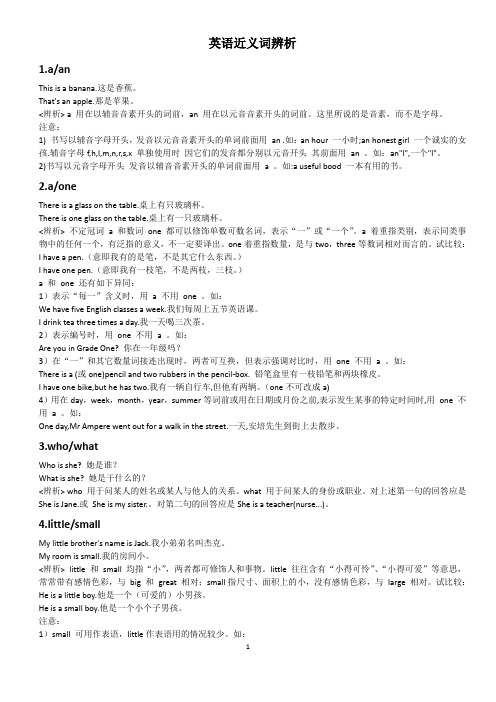
英语近义词辨析1.a/anThis is a banana.这是香蕉。
That's an apple.那是苹果。
<辨析> a 用在以辅音音素开头的词前,an 用在以元音音素开头的词前。
这里所说的是音素,而不是字母。
注意:1) 书写以辅音字母开头,发音以元音音素开头的单词前面用an .如:an hour 一小时;an honest girl 一个诚实的女孩.辅音字母f,h,l,m,n,r,s,x 单独使用时因它们的发音都分别以元音开头其前面用an 。
如:an"l",一个"l"。
2)书写以元音字母开头发音以辅音音素开头的单词前面用a 。
如:a useful bood 一本有用的书。
2.a/oneThere is a glass on the table.桌上有只玻璃杯。
There is one glass on the table.桌上有一只玻璃杯。
<辨析> 不定冠词a 和数词one 都可以修饰单数可数名词,表示“一”或“一个”。
a 着重指类别,表示同类事物中的任何一个,有泛指的意义,不一定要译出。
one着重指数量,是与two,three等数词相对而言的。
试比较:I have a pen.(意即我有的是笔,不是其它什么东西。
)I have one pen.(意即我有一枝笔,不是两枝,三枝。
)a 和one 还有如下异同:1)表示“每一”含义时,用a 不用one 。
如:We have five English classes a week.我们每周上五节英语课。
I drink tea three times a day.我一天喝三次茶。
2)表示编号时,用one 不用a 。
如:Are you in Grade One? 你在一年级吗?3)在“一”和其它数量词接连出现时,两者可互换,但表示强调对比时,用one 不用a 。
如:There is a (或one)pencil and two rubbers in the pencil-box. 铅笔盒里有一枝铅笔和两块橡皮。
2022年人教版七年级上册英语-Unit9 My favorite subject is scien

Dear Jenny,
I am very busy on Friday. At 8:00 I have math. It is not fun. The teacher says it is useful, but I think it is difficult. Then at 9:00 I have science. It is difficult but interesting. At 10:00 I have history. After that, I have P.E. at 11:00. It is easy and
Boy 1: What’s your favorite subject? Boy 2: My favorite subject is P.E.. Boy 1: Why do you like P.E.? Boy 2: Because it’s fun. How about you? What’s your favorite subject? Boy 1: Hmm. My favorite subject is music. Boy 2: Really? Why? Boy 1: Because it’s relaxing. Boy 2: What subject do you not like? Boy 1: I don’t like history because it’s boring. Boy 2: Really? I don’t like geography because it’s really difficult.
Lunch is from 12:00 to 1:00
• from ……to…… 从……到…… • We have English from Monday to Friday. • We watches TV ______7:00____9:00.
八年级英语unit 5 can you come to my party 通用版知识精讲

初二英语Unit 5 Can you come to my party? 通用版【本讲主要内容】Unit 5 Can you come to my party?通过本课的学习,我们应该能做下面的事:1. 学会礼貌地发出、接受、拒绝邀请。
2. 谈论自己或别人必须做的事情。
3. 学习根据日程表中的计划安排自己的活动。
4. 学习can及其它情态动词的用法。
【知识掌握】【知识点精析】同学们,你们的课余时光是怎样度过的呢?你都有一些什么样的课余生活呢?你有没有邀请过你的好友一起看电影、打球、听音乐会或者参加聚会呢?相信你通过第五单元的学习,一定可以用准确的英语熟练地表达你的这些想法。
【词汇用法】1. lesson n. 功课、课程We had a history lesson at school this morning. 我们今天早上在学校上了一堂历史课。
an English lesson=a lesson in English 英语课give lessons in drawing 上绘画课lesson与class的区别lesson课程(更强调上课的内容);class班级(更强调上课的环境)We have four lessons in the morning and two in the afternoon. 我们上午有4节课,下午有2节。
She was in a class of thirty students. 她在一个有30个学生的班里。
2. invitation n. 邀请I have received an invitation to their party. 我收到了他们宴会的请贴。
make invitations 发出邀请accept invitations 接受邀请decline invitations 拒绝邀请invite v. 邀请Thank you for inviting me. 谢谢你的邀请。
learn_与_study_、lesson与class用法区别
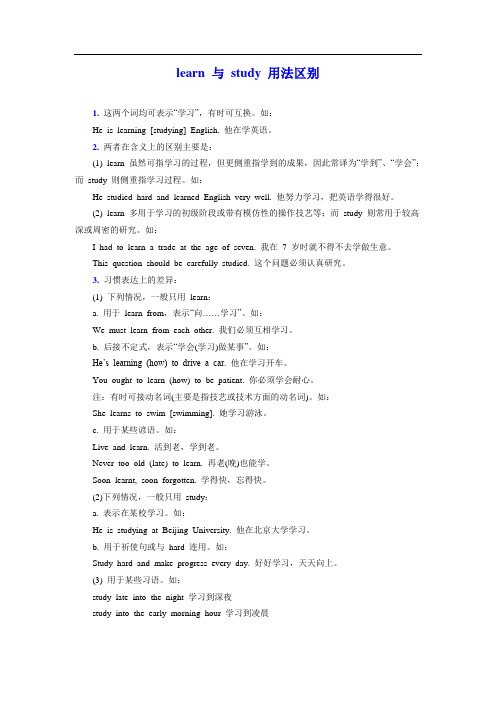
learn 与study 用法区别1.这两个词均可表示“学习”,有时可互换。
如:He is learning [studying] English. 他在学英语。
2.两者在含义上的区别主要是:(1) learn 虽然可指学习的过程,但更侧重指学到的成果,因此常译为“学到”、“学会”;而study 则侧重指学习过程。
如:He studied hard and learned English very well. 他努力学习,把英语学得很好。
(2) learn 多用于学习的初级阶段或带有模仿性的操作技艺等;而study 则常用于较高深或周密的研究。
如:I had to learn a trade at the age of seven. 我在7 岁时就不得不去学做生意。
This question should be carefully studied. 这个问题必须认真研究。
3.习惯表达上的差异:(1) 下列情况,一般只用learn:a. 用于learn from,表示“向……学习”。
如:We must learn from each other. 我们必须互相学习。
b. 后接不定式,表示“学会(学习)做某事”。
如:He’s learning (how) to drive a car. 他在学习开车。
You ought to learn (how) to be patient. 你必须学会耐心。
注:有时可接动名词(主要是指技艺或技术方面的动名词)。
如:She learns to swim [swimming]. 她学习游泳。
c. 用于某些谚语。
如:Live and learn. 活到老,学到老。
Never too old (late) to learn. 再老(晚)也能学。
Soon learnt, soon forgotten. 学得快,忘得快。
(2)下列情况,一般只用study:a. 表示在某校学习。
七年级仁爱英语下册-UNIT5-TOPIC3试卷(含答案)

Unit 5 Our School LifeTopic 3 My school life is very interesting.Ⅰ.单项选择。
(10分)( )1.We often do our outdoor _____ at 4:20.A.activityB.actC.activitiesD.active( )2.—Where’s Mike?—He is working _____ physics _____ in the classroom.A.in; problemB.out; problemC.in; problemsD.on; problems( )3.Linlin often wears a red skirt. She _____ like red very much.A.mustB.canC.wouldD.may( )4.History is a useful subject. We can learn _____ the past.A.ofB.aboutC.fromD.at( )5.How many music _____ do you have every week?A.classB.class’C.lessonsD.lesson( )6.— _____ do you like science?—Because it’s interesting.A.WhatB.WhenC.WhichD.Why( )7.He often _____ English _____ his classmates. So his English is wonderful.A.says; toB.speaks; withC.talks; withD.tells; to( )8.—_____ class are you having?—We are having an English class.A.WhichB.WhatC.WhenD.Why( )9.There is a soccer game _____ Class One and Class Two on the playground at 5:00 this afternoon.A.ofB.bothC.betweenD.on( )10.Tom often _____ TV on Saturday evenings, but now he is _____ stories.A.watches; readingB.watching; readsC.looks; readingD.watches; lookingⅡ.情景交际。
class, course, lesson 和 lecture的区别

class, course, lesson 和lecture的区别
class 指学生在班级一起上课,表示以40分钟/45分钟为单位的课堂教学活动。
I have an English class on Monday. 周一我有一节英语课。
Don’t talk in class. 在课上不要讲话。
Classes were cancelled because of a staff meeting. 今天的课取消因为要召开教职工大会。
course 指一段时间要教完或学完的课程,关于某学科一系列的课程。
Come and join our English courses. 加入我们的英语课程。
Our course lasts for three months. 我们的课程持续3个月。
I want to take a course in art and design. 我想攻读美术与设计课程。
lesson 指侧重于“课业内容“的课或功课。
She tried her best to make science lessons more interesting. 她尽最大的努力使科学课变得有趣。
Mr Smith was preparing her lesson with his colleagues.
Smith 先生和他的同事正在备课。
lecture (通常指大学里的)讲座,讲课,演讲
The professor was giving a lecture on art. 教授正在上一门艺术课。
In his lecture, we learnt a lot. 在他的讲座里,我们学到了很多的东西。
class和lesson的区别

class和lesson的区别
1两者都作“一节课”解时可以互换。
例如:
We are not going to have any classes/lessons next week.
下星期我们不上课。
2class和lesson还有其它含义,这时两者通常是不能互换的。
例如:1)class可以作“课堂;班级;阶级”解,lesson没有此意。
例如:There are forty-six students in our class.我们班有四十六名学生。
2)lesson可以作“功课;科目;(课本中的)一课;教训”解,但class 不可以。
例如:
They are doing their lessons.他们正在做功课。
If someone puts you down,you should teach him a lesson.
如果有人奚落你,你就应该教训教训他。
短语:
have/ take lessons 上课
(注:专业文档是经验性极强的领域,无法思考和涵盖全面,素材和资料部分来自网络,供参考。
可复制、编制,期待你的好评与关注)。
辨析class, lesson配套课件
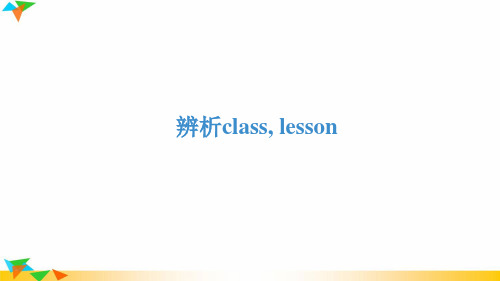
Class is at eight. 8点开始上课。
二、 辨析class, lesson
下列情况通常只用class: 1. 表示“班、班级”等。
He is in Class Five. 他在五班。 2. 表示在同一个班级学习的“学生”。
辨析class, lesson
class 意为“班级、课”; lesson 意为“课、功课”。 两者既有联系,又有区别。
一、 辨析class, lesson
表示具体意义的课或上课时间,class / lesson均可,此时两者都是可数名词。 Each maths class / lesson lasts 40 minutes. 每节数学课上40分钟。
The class are taking notes. 全班学生都在做笔记。
三、 辨析class, lesson
下列情况通常只用lesson: 1. 表示课本中的“一课”。
Lesson Five is very interesting. 第五课很有趣。 2. 表示“功课、课程”等。
We do our lessons in the evenபைடு நூலகம்ng. 我们晚上做功课。
即时练习
用所给词的适当形式填空(class, lesson)。 1. We study English, Chinese, maths and other __le_s_s_o_n_s__. 2. _C_l_a_ss_ begins at 8:00. 3. Today we will learn __L__es_s_o_n__ Fifteen. 4. Linda is in __C_l_a_ss__ One, Grade Three. 5. We have four _c_l_as_s_e_s_/_l_e_ss_o_n_s_ every morning.
七年级英语所有易错u3知识点

七年级英语所有易错u3知识点第一部分:基础词汇在学习英语U3知识点时,基础词汇是极为关键的一部分。
下面整理出易错的几个词汇及解释,帮助大家更好地理解:1. Exchange:v.交换;n.交流,兑换2. Spend:v.花费,度过3. Buy:v.购买4. Gift:n.礼物5. Choose:v.选择第二部分:易混淆单词在U3的学习中,由于某些单词的拼音和发音相似,避免不了会混淆。
因此,我们需要更深刻地了解以下几个单词的差异,避免在写作和口语表达中出现错误。
1. Lesson与Class的区别: Lesson是“课”,指一节完整的学科课程。
Class是“班级”,指学生一起上课的组织形式。
2. Smell与Taste的区别:Smell是“气味”,指嗅觉所感知的感官体验; Taste是“味道”,指舌头上的感官体验。
3. Send与Bring的区别:Send是“寄送”,指让物品离开自己并到达目的地。
Bring是“带来”,指让物品从别的地方带到身边。
第三部分:常见语法错误英语学习中,语法是许多人的短板。
因此,这里总结了一些易错的语法规则,提醒大家在写作中要留意。
1. 主谓不一致:如“He like playing football.”2. 计量单位不一致:如“5 kilos of apples”与“5 pieces of oranges”。
3. 形容词、副词误用:如“He run very quickly”。
4. 人称代词误用:如“Me and him went to the park.”总结:学习英语要重视基础词汇,注意单词间的区别和语法规则的正确运用。
只要认真学习,多下功夫,就能够轻松学好英语。
英语课的单词怎么拼
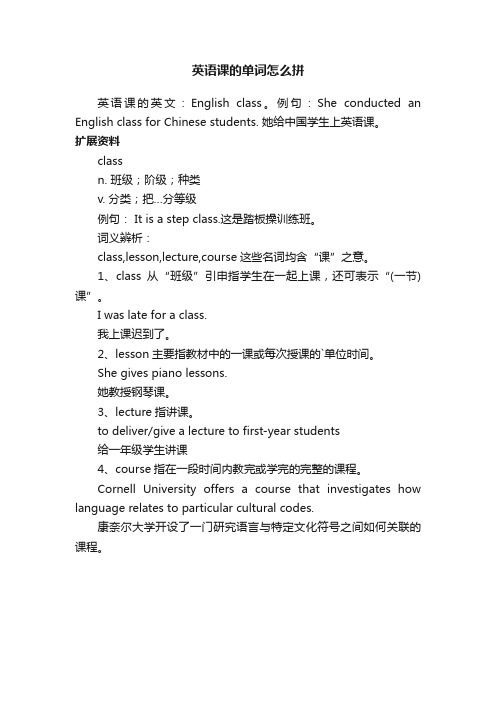
英语课的单词怎么拼
英语课的英文:English class。
例句:She conducted an English class for Chinese students. 她给中国学生上英语课。
扩展资料
class
n. 班级;阶级;种类
v. 分类;把…分等级
例句: It is a step class.这是踏板操训练班。
词义辨析:
class,lesson,lecture,course这些名词均含“课”之意。
1、class从“班级”引申指学生在一起上课,还可表示“(一节)课”。
I was late for a class.
我上课迟到了。
2、lesson主要指教材中的一课或每次授课的`单位时间。
She gives piano lessons.
她教授钢琴课。
3、lecture指讲课。
to deliver/give a lecture to first-year students
给一年级学生讲课
4、course指在一段时间内教完或学完的完整的课程。
Cornell University offers a course that investigates how language relates to particular cultural codes.
康奈尔大学开设了一门研究语言与特定文化符号之间如何关联的课程。
- 1、下载文档前请自行甄别文档内容的完整性,平台不提供额外的编辑、内容补充、找答案等附加服务。
- 2、"仅部分预览"的文档,不可在线预览部分如存在完整性等问题,可反馈申请退款(可完整预览的文档不适用该条件!)。
- 3、如文档侵犯您的权益,请联系客服反馈,我们会尽快为您处理(人工客服工作时间:9:00-18:30)。
当她匆匆赶进教室时,布莱克先生已经开始在讲课了。
They all enjoyed their lessons.
他们都很学喜欢他们所学的功课。
以上场合所指的“课业”,多半与内容有关,故选用lesson为宜。
问题在于,那是法兰西沦陷区的最后一堂法语课。不论教师还是学生,甚至连全体市民们,都关切地专注着它的内容,而不是形式。因例句:
What shall we do in our English class tomorrow?
明天的英语课我们要做什么?
再看下面几个包含lesson的例句:
Ms Smith was preparing the new lesson with other teachers.
史密斯女士正和别的老师一起备新课。
When she hurried into her classroom, Mr Black was already beginning his lesson.
开始上课 用英语怎么说?
Let's begin/start our English lesson/class.
class与lesson属同义词,两者均表示“课业”的意思,常可通用。例如:
There is a physics class/lesson on Tuesday.星期二有一节物理课。
然而,指“形式”或“内容”,往往取决于说话人的主观意念。比如,下课时,教师通常说:“Class is over”,因为这句话几乎总是在下课铃声敲响的时候说的。此时,一听到铃声,人们总直觉地联想到“45分钟”的课业形式结束了。但也未必尽然。19世纪法国作家阿尔封斯·都德(Alphonse Daudet,1840-1897)的名篇《最后一课》中,那法语教师听到教堂的钟声敲响了之后,宣布下课时所说的话,其英译文就用:“The lesson is over”(参见高中《英语》第二册The Last Lesson,p.183)。
Yesterday I was late for the politics class.
昨天我上政治课迟到了。
In our school each class lasts 40 minutes.
我们学校,每节课上40分钟。
以上场合所指的“课业”多半与形式有关,故选用class为宜。
lesson与class的区别
1. class表示“一节课两节课的)课”, 指以40或45分钟为单位的课堂教学活动,也可指“(学校的)班级”或‘全体学生“。如:We have no clases on Sundays.
2. lesson的意思是“课文,功课”或“(一节课两节课的)课”, 着重指教学内容而言, 做“课”解时可和class换用。如:We have no classes/ lessons on Sundays. Please read Lesson Six. The book has sixteen lessons.
但认真推敲起来,它们在意义上仍略见不同:前者侧重于课业的形式,而后者侧重于课业的内容。比如说:“I have two classes this afternoon.”时,讲话人所强调的是“两个45分钟”的课业形式,而当他说:“I have two lessons this afternoon.”时,则着重强调“两个学科”的课业内容。
